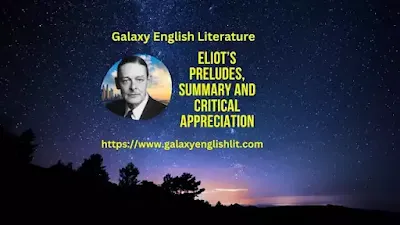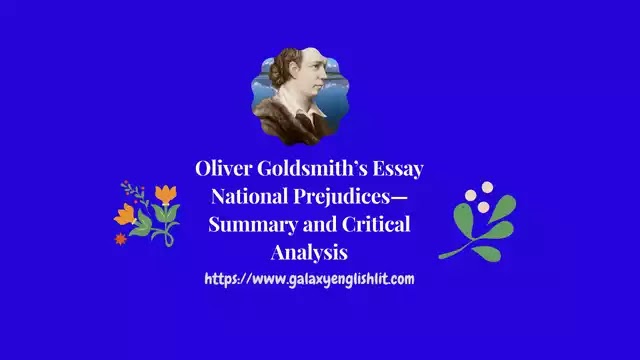Introduction of the Poem:
“Preludes” was written in 1915. It was first published in Lewis’ Blast in 1915. Later on it was published in the collection “Prufrock” in 1917. The four uneven section of this poem were written at different times during the poet's study at Harward University and Europe. The first two parts of this poem present evening and morning, stressing the smells and general sordidness of the street scene. The last two parts of the poem depict a city - bred women getting up early in the morning with her sordid thoughts and fancies and the picture of a man who considers himself ‘the conscience of blackened street’. He is impatient to remould and mend the world. Both the man and the woman presented in the last two parts of the poem suffer inwardly from their perception of their miserable lives of squalor and routine. Ultimately the poet speaks in his own person to sympathise but remains failure to do so since the world is eternally afflicted with strange malady.
 |
| Eliot’s Preludes, Summary and Critical Appreciation |
This poem can be seen through the eyes of a wanderer who wants to observe the city life through the streets and tries to come to some conclusion about the meaning of life he sees around him. Emotional selection heightens what is seen. One should carefully note the qualifying words, for they intensify the significance of what is seen. The image reflects the mind.
Summary of the Poem:
The poet describes winter evening. Due to being winter season, the days are shorter and the Sun sets early. With the Sun set evening approaches. With the approach of evening, the darkness begins to pervade all around. In this way, the smoky day has come to an end . As the evening settles one can feel the smell of steaks in the narrow passageways of apartments. The houses are small and narrow, so the smell of cooking from one kitchen reaches to other. Suddenly the showers of rain begin with the sharp gust of wind. The dry leaves and the scraps of newspaper are blown around with the sharp gust of wind and they cling to the feet of the people walking through the streets. The people who live in the streets are poor. The curtains of windows and doors are torn. The showers of rain beat against the torn curtains and chimney pots of the houses. At the corner of street, a cab horse is standing for long. The horse is feeling restless in the showers of rain. It is impatient to move on the road. Steamy vapours rise from the flanks as the rain falls on them. Sometimes to show its impatience, it stamps its feet on the ground. The lighting of the lamp does not illuminate in a positive sense. It only serves to highlight the miserable condition of the street after the gush of rainfall.
The morning brings a new day for the materialistic people of the city. With the approach of morning they become conscious for engrossing in the activities of the next day. The next morning provides no change to the people who are completely drowned in materialism and are determined to cling with the same status or routine of life. In the age of materialism, everything is firmly established. Everything is dull and monotonous. Next, the speaker tells us about the foul smell which is pervaded in the air. New day and new morning cannot freshen the atmosphere. With the advancement of materialism, the freshness has almost disappeared. The foul smell is coming out from those small vessels and containers in which a very small dose of beer was left last night. The beer containers are lying in the same state. The muddy street has been covered extently with sawdust. The people have walked on the sawdust. They have trampled it with their feet. Due to being utter wet under the sawdust, the footprints of the people are clearly visible on the road. With the approach of morning the people are hurrying to the shops and stalls of the coffee as they are accustomed to drinking it. The coffee shops which are situated by the road side are opened early in the morning. The speaker describes the next false show. In every home, the people have awakened and the movement of their hands casts dull and dim shadow on windows pane. They are raising the dirty window screens of their furnished rooms. The people of this materialistic age remain under the illusion that by removing curtains of their windows pane, the light will enter their well-furnished room, but they forget one thing that their own lives are into utter darkness and they are living a life of despair.
Next, the speaker describes about a woman, who wakes up from her sleep. She throws away the blanket aside. She still seems to be in idleness. Perhaps she has not slept soundly at night, so she still feels drowsiness. She lies on her back and prepares herself to get up from the bed. While lying on her back, the images and activities of last night begin to haunt her mind. She is a prostitute. She remembers the experience of her sexual intercourse which was made with some man last night. Her soul is at once filled with a thousand sordid images. The images flash upon her mind like the pictures shown from a projector on the ceiling. When she is engrossed in her past thoughts, she suddenly hears the noiseful activities in the filthy street. She sees the glimpse of light which peeps through the cracks of the shutters. She feels that the Sun has risen. She hears the chirping of the sparrows in the squalor of the gutter. She thinks of the filthy street where she walks and waits for the customers. This street i.e., this modern society or this materialistic world does not understand her pain involved in her dirty and immoral profession of prostitution. The speaker thinks that perhaps some individual circumstance has forced her to adopt this filthy profession. He (the speaker) thinks that she may be influenced by the excessive materialism and she may wander in the world of fancies. In order to fulfil her dreams and ambitions, she may adopt this unhealthy, immoral and filthy profession of prostitution. This man dominated society is also extently responsible for her suppression. But while adopting this profession, she would have ignored the consequences of this profession. Before moving out in the street according to her daily routine, she sits on the edge of bed, takes off her hair the papers with which she curls her hair. She feels some pain in the soles of her feet, so, in order to get somewhat relief, she holds both the diseased soles of her feet with the palms of her dirty hands and presses them tightly. The speaker thinks that she may suffer from some disease; hence, her soles have grown pale. Due to involving in the profession of prostitution her body may be the abode of various diseases.
The speaker, who is the man of conscience, feels restless in city life. His soul is badly suppressed by the selfish and materialistic tendencies of city life. He feels his soul is like a street that is trampled all the time by people walking across it. He feels highly dejected to the routine life of the people of the city. The whole life of the people revolves around materialism. They remain busy from morning to evening under the expectation of gaining the materialistic comforts. When the day's activities are over, the people have to return home from their daily task or office work. The speaker finds some people busy in filling their pipes with tobacco. But some others read the evening newspapers. The assurance about material comforts constitutes the conscience of the street - walkers. The materialistic people are spiritually hollowed. They have no divinity in them. Their souls have darkened under the influence of corrupt, selfish and immoral tendencies. The speaker takes a charge of making an improvement in the social and moral values. The speaker is deeply moved by observing the dreary scenes of life of city. He sees the people clinging to this monotonous life of city . He observes that gentleness has also become the victim of endless sufferings. The speaker thinks that there is no use worrying over these things, so he decides to give up his vain effort to remould the society and world. He comes to realise that life is nothing but an empty show. He laughs to think that universe takes no notice of these things because these things cannot be changed. These things would go on surviving like the planets.
Critical Appreciation of the Poem:
Introduction:
Preludes is one of Eliot's most prominent poems because it presents his view of society at that time using concrete objects and images to metaphorically explore the nature of life and society. It depicts city life. It is not the city life which is glamour and brilliance; it is the shabby city life. It brings out the dreariness of modern city life. The poet does not say anything for or against such life. He merely states what he can see, or what is seen in such a squalid and ugly street where many people live in the dingy shades of furnished rooms. In the poem, we discover society as corrupt and desolate going through a cycle of meaningless routine where people bare a false hope of a divine source overlooking and protecting humanity.
Thought - Content:
The poem opens with the picture of the cold winter evening in London. The atmosphere all around is suffocating in the sense that the foul smell of steaks fills the narrow passageways. It is almost six O'clock in the evening. The second part brings us to the morning. Just as the evening settles down, so now the morning comes to consciousness as if evening and morning have a life of their own to which we are enslaved. Again the feeling is one of oppressiveness. The third part switches to the scene to a bed room, where a woman is dozing off, soon after she wakes up from sleep. Finally the evening settles down once again and the men are seen jostling on the long stretched street, after they are over with the office work. While some of them are filling pipes with tobacco, some others are reading evening newspapers. The poet observing the dreary scenes of life is deeply moved. He tries to find something better inside the boredom of life. But the next moment he gives up his vain attempt.
A Deeply Thoughtful Poem:
The poem illustrates human misery and reality of life. It gives a wide image of life. Life is not only based on materialism but it is based on the fruitful essence of trials and tribulations. It thrives on man's alienation in the modern world. The poet makes men realise their downfall and uncertainty in this new era, however men's unwillingness to change is equally their downfall. The poet basically addresses man's eternal problems and provides an unsugar coated view into reality. The poem states the bare reality of life, misery, anarchy etc. It gives an awareness of man's social unrest in an industrial society showing us how monotonous life can be when alienating from society and running after materialism.
A Relevant Poem for Future Generation:
The poet lived during the time of great depression and therefore with this poem addressed many issues which made mankind corrupt but this poem will always be relevant for future generations to come. This poem presents human misery and depression in such a way that it makes one realise how common and lost our lives are. It also creates an enthusiasm within a person to persist in changing his life around in such a way that he finds peace and happiness within himself. It brings to light the issue of human despair which is evident in today's time. It is a prelude to what is to come in the future - the total moral collapse of the world.
The Use of Symbols and Images:
The word ‘winter’ symbolises harshness, coldness and lifelessness. To winter is added the image of evening which marks the approach of night, again, symbolising the approach of darkness into the very lives of people. The smell of steaks is passageway suggests the mundane, ordinary nature of life. The smell of steaks pervades the air in passageways therefore, is like how monotony pervades the lives of people. The burnt - out ends of cigarettes, the smoky days, the grimy scraps, the withered leaves, the vacant lots, broken blinds, lonely cab horse are all symbols that signify the monotony and dreariness of life. The shower beating upon the torn window - screen and chimney pots enhances depression which is glaringly visible with the “lighting of the lamp”. The lamp however doesn't illuminate in a positive sense. It only serves to highlight the miserable condition of the streets after the gush of rainfall. The lonely cab horse may symbolically represent the lonely man or even the lonely poet. The mention of “the notion of some infinitely gentle infinitely suffering thing” is a reference to Jesus, a divine source, whom many people of society rely on for hope.
Form, Style and Language:
“Preludes” is a lyric poem in free verse, divided into four numbered parts of thirteen, ten, fifteen, and sixteen lines. In music, preludes are short works, typically free from created to introduce more formal and larger compositions. When T. S. Eliot picked this musical title no doubt he intended to use it to suggest the mood and method of longer works composed in the same period. The first stanza introduces the tone of the poem with a description of a typical street from an omniscient point of view. We are first given the impression of a desolate, corrupt and exhausted society through the use of alliteration of the ‘s’ sound in words like ‘x’. This technique evokes our sense of smell imagining the picture Eliot is describing. The poet stresses out the fact that it is now morning, the possibility of a new start, through the use of personification. The first three lines of the first section depict a haunted and restless night using the repetition of ‘you’. In the final or fourth section ( part ) of the poem the alliteration of the ‘s’ is reintroduced here in the first line “soul stretched tight across the skies ...” Eliot points out the action of ‘stretching’ to suggest a sense of pain and agony created by restlessness. The accumulation of “four and five and six o'clock" infers a rhythm and a busy on-going routine which society goes through almost like in a mechanical way.





